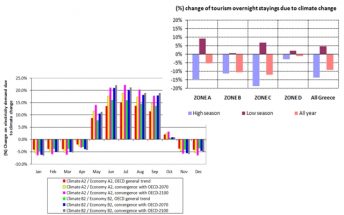CLIMATE CHANGE AND IMPACTS
Future mapping projections up to 2100 of climate change focusing on mean and extremes using various regional climate models and greenhouse gases scenarios.
Regional climate model data provision for several greenhouse gases scenarios for specific case study regions in Greece upon request.
Climate change impact indicators of relevance to agriculture such as changes in the number of frost nights and length of growing season.
Climate change impact indicators of relevance to energy demand such as changes in the cooling or heating demands.
Climate change impact indicators of relevance to population health such as changes in discomfort associated with heat and humidity.
Climate change impact indicators of relevance to the tourism sector such as changes in the tourist comfort potential or the length of the tourism season.
Climate change impact indicators of relevance to forest fires such as changes in fire risk or fire season length.
Tailored made products for stakeholders and policy makers such as the user-friendly Google-maps application (OIKOSKOPIO) constructed by NOA and WWF for the needs of forest fire planners and policymakers.
Develop online web-tools to support decision making for climate change adaptation to various sectors (eg agriculture, urban environment (ADAPT2CLIMA tool, URBANPROOF toolkit), etc.
Develop monitoring indices based on qualitative and quantitative data aimed to create an effective mechanism to monitor, evaluate and update climate change actions and policies at national level. (LIFE IP ADAPTinGR https://www.adaptivegreece.gr/en-us/)

ASSESSMENT OF THE VULNERABILITY OF ACTIVITIES/ENTERPRISES TO CLIMATE CHANGE
Qualitative and quantitative assessment of the vulnerability of activities/ enterprises/ investments to climate change on the basis of the most recent available findings of relevant research projects and scientific literature.
Assessment of the cost of climate change impacts – Estimation of risks and opportunities stemming from climate change for various businesses and exonomic sectors.
Identification and assessment of measures for adaptation to climate change by means of development/ application of suitable decision-aid methodologies and tools.


